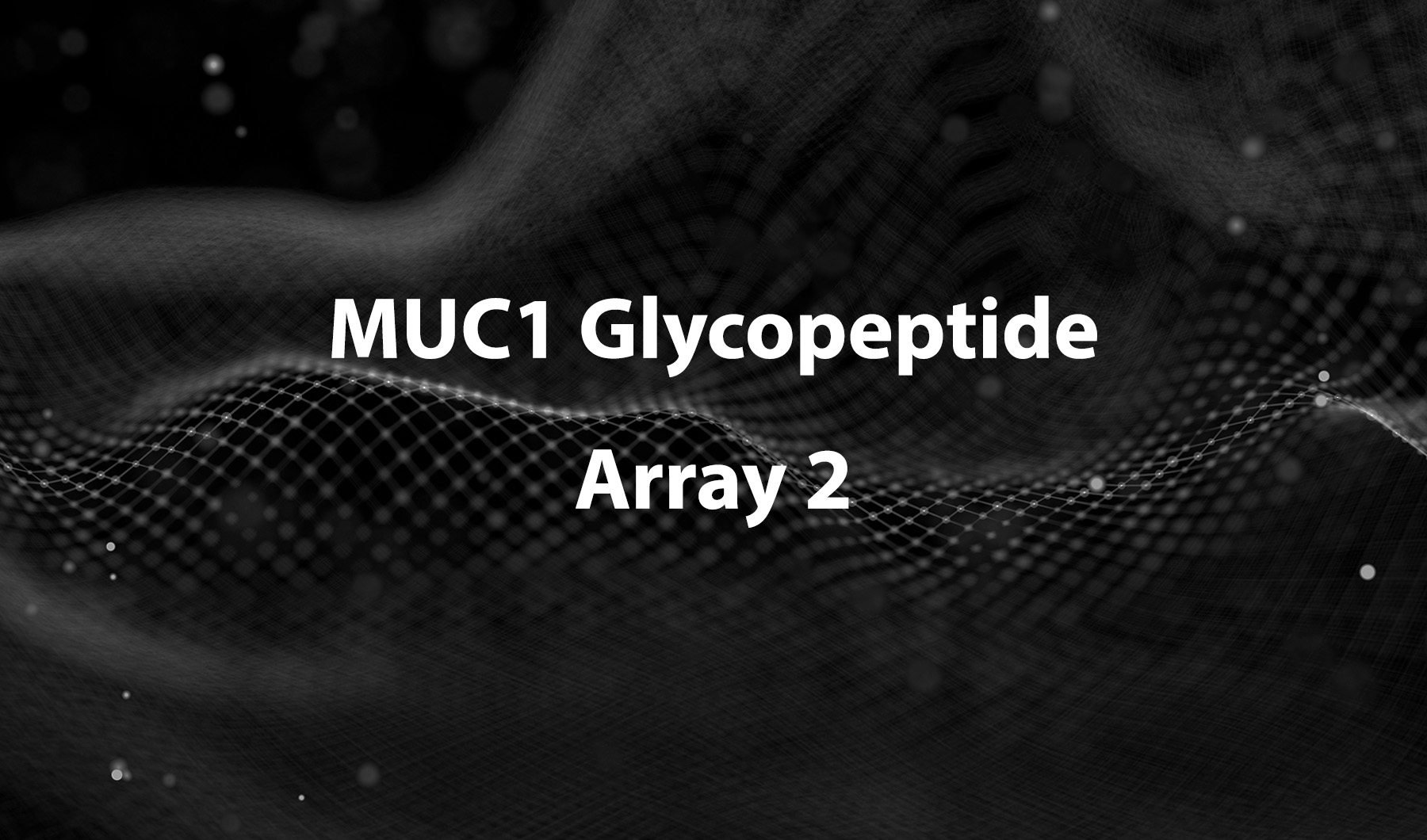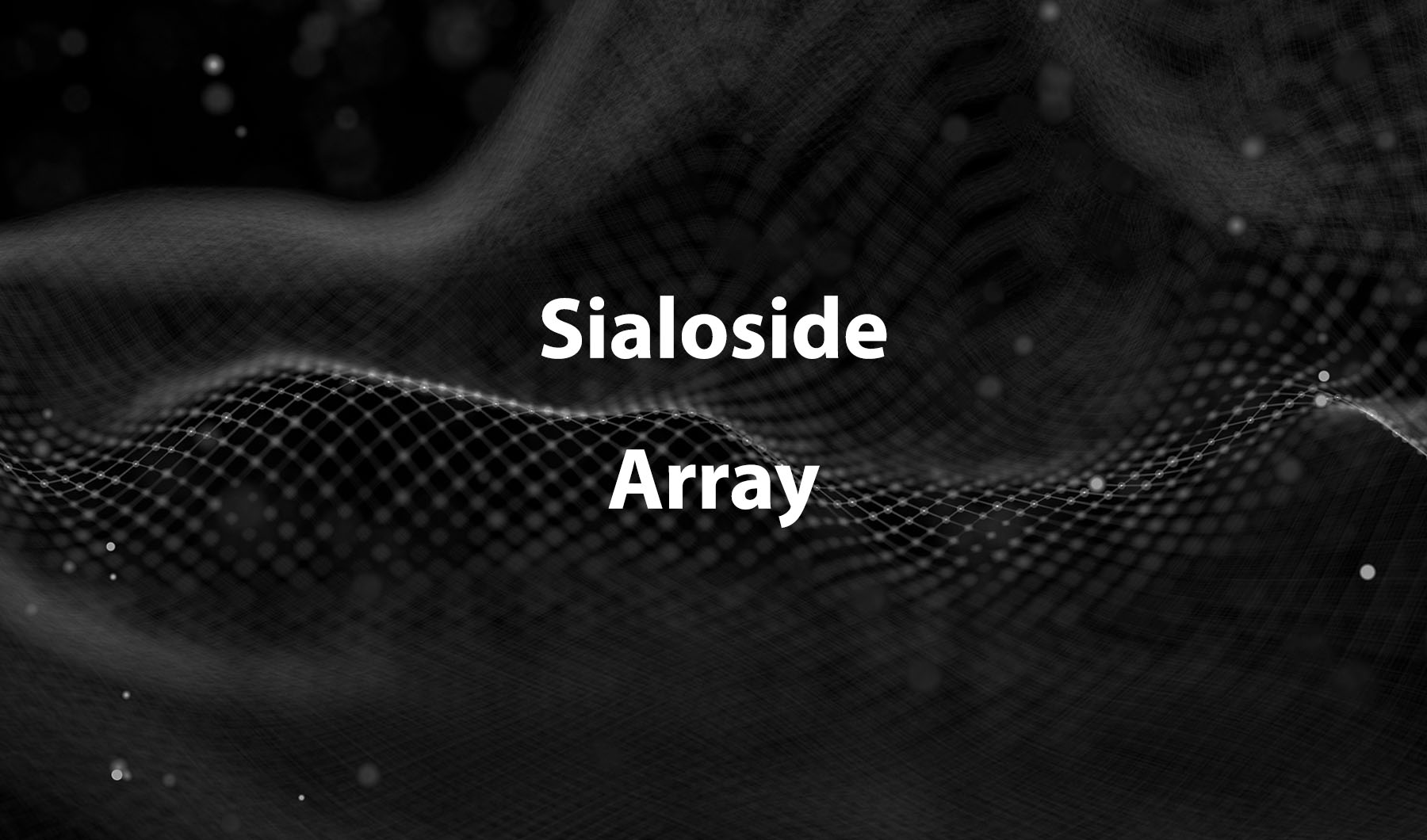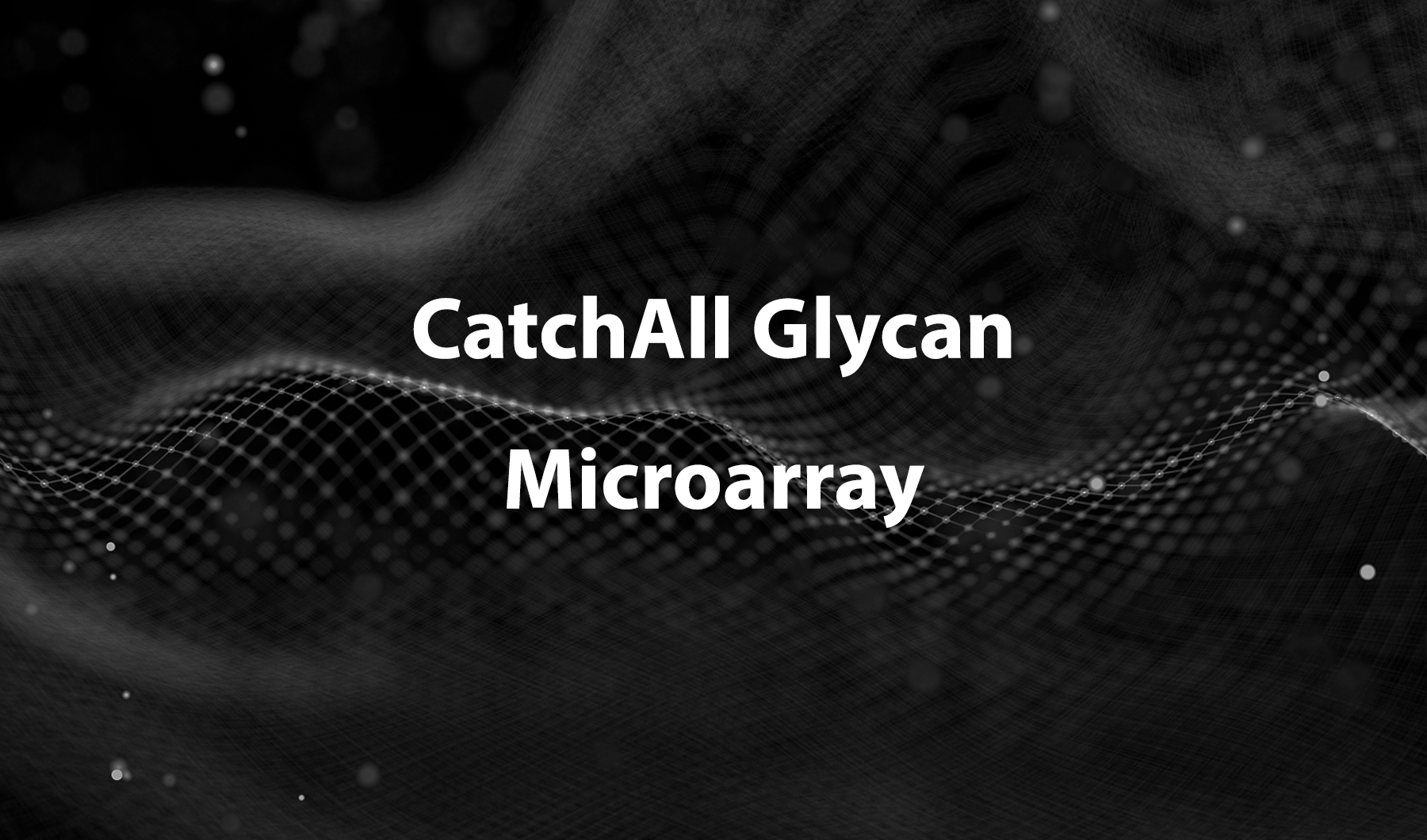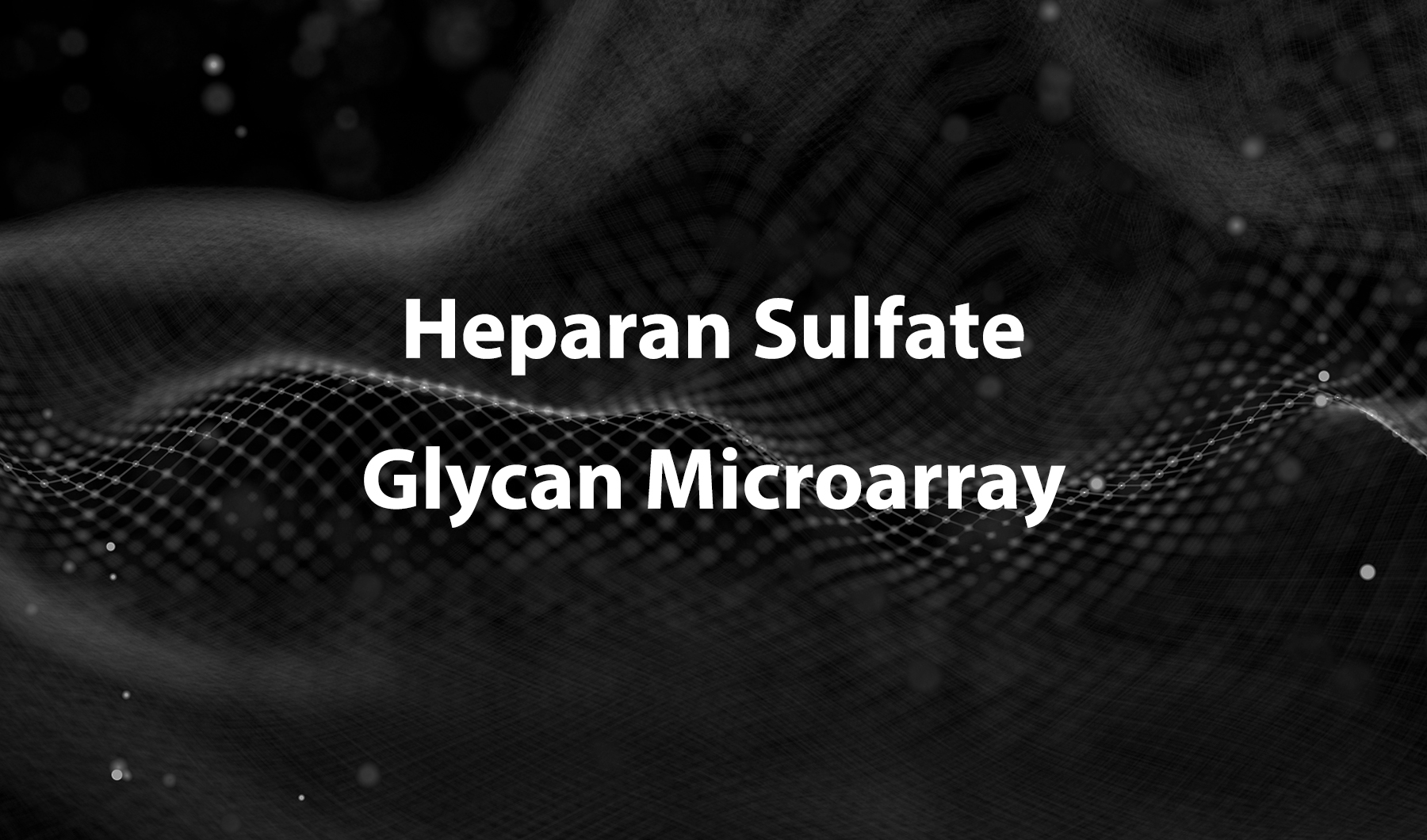

From: $1,104.00
The heparan sulfate (HS) glycan array allows researchers to explore binding interactions with 24 structurally – defined heparin and heparan sulfate structures varying in length and sulfation. This array can be applied to define binding specificities of various biological samples, such as proteins, antibodies, cells, vehicles, and viral particles. Each array contains 8 or 16 identical subarrays, enabling the simultaneous analysis of multiple samples. The heparan sulfate glycan array provides high-throughput and reliable glycan-binding information with a simple assay format that only requires a small sample volume. Results can be obtained in only a few hours, making investigating heparin/heparan sulfate binding easy and efficient. The heparan sulfate glycan array can be customized to meet individual client needs. Assay services are available upon request.
Heparan sulfate (HS) glycans are sulfated, unbranched, negatively charged saccharide chains. These linear and complex polysaccharides are found in various tissues and serve as critical components of the extracellular matrix. Heparan sulfate proteoglycans (HSPGs) are chains of HS covalently attached to proteins. The biological functions of HSPGs are determined by each HS chain’s length and sulfation pattern, and alterations of these features significantly impact their biological functions.
HS and HSPGs are essential components of the human body. HS and HSPGs interact with diverse proteins to maintain physiological homeostasis. The binding partners of HSPG include cytokines, growth factors, immune receptors, and enzymes. In addition, HSPGs can interact with numerous extracellular matrix proteins to form tissue scaffolds. HSPGs can also promote lipid uptake by binding to lipoproteins and lipoprotein lipase. The diverse biological functions of HS and HSPGs have gained significant interest in the scientific community. Identifying and characterizing these complex carbohydrate structures in various biomedical contexts has become a major discipline in glycomics.
Although HS and HSPGs are essential in normal physiology, dysregulation of these carbohydrate molecules has been linked to diseases. For example, HSPGs have been implicated in cancer pathogenesis, impacting processes such as tumor-induced angiogenesis, immune evasion, and remodeling of the tumor-associated ECM. In addition, HSPGs have been associated with amyloid diseases such as Alzheimer’s disease, Parkinson’s disease, and TTR amyloidosis due to the occurrence of HSPGs in amyloid plaques and the observed fact that HS chains promote fibrillogenesis. HS and HSPGs are also receptors or co-receptors for invading viruses or other microorganisms to gain entry into the host cell. The roles of HS and HSPGs in disease trajectory are evident, and the underlying molecular mechanisms warrant further investigation. Understanding the biological functions of these molecules in human health and disease is indispensable.
ZBiotech has developed a robust microarray platform that allows researchers to explore binding interactions with 24 structurally – defined heparin and heparan sulfate structures varying in length and sulfation. The heparan sulfate (HS) glycan array can be applied to determine the binding specificities of various biological samples, such as proteins, antibodies, cells, vehicles, and viral particles. Each array contains 8 or 16 identical subarrays, enabling the simultaneous analysis of multiple samples. The heparan sulfate glycan array provides high-throughput and reliable glycan-binding information with a simple assay format that only requires a small sample volume. Results can be obtained in only a few hours, making investigating heparin/heparan sulfate binding easy and efficient. The heparan sulfate glycan array can be customized to meet individual client needs. Assay services are available upon request.
Features
Applications
List of heparin & heparan sulfate glycan structures on the array (download the PDF)
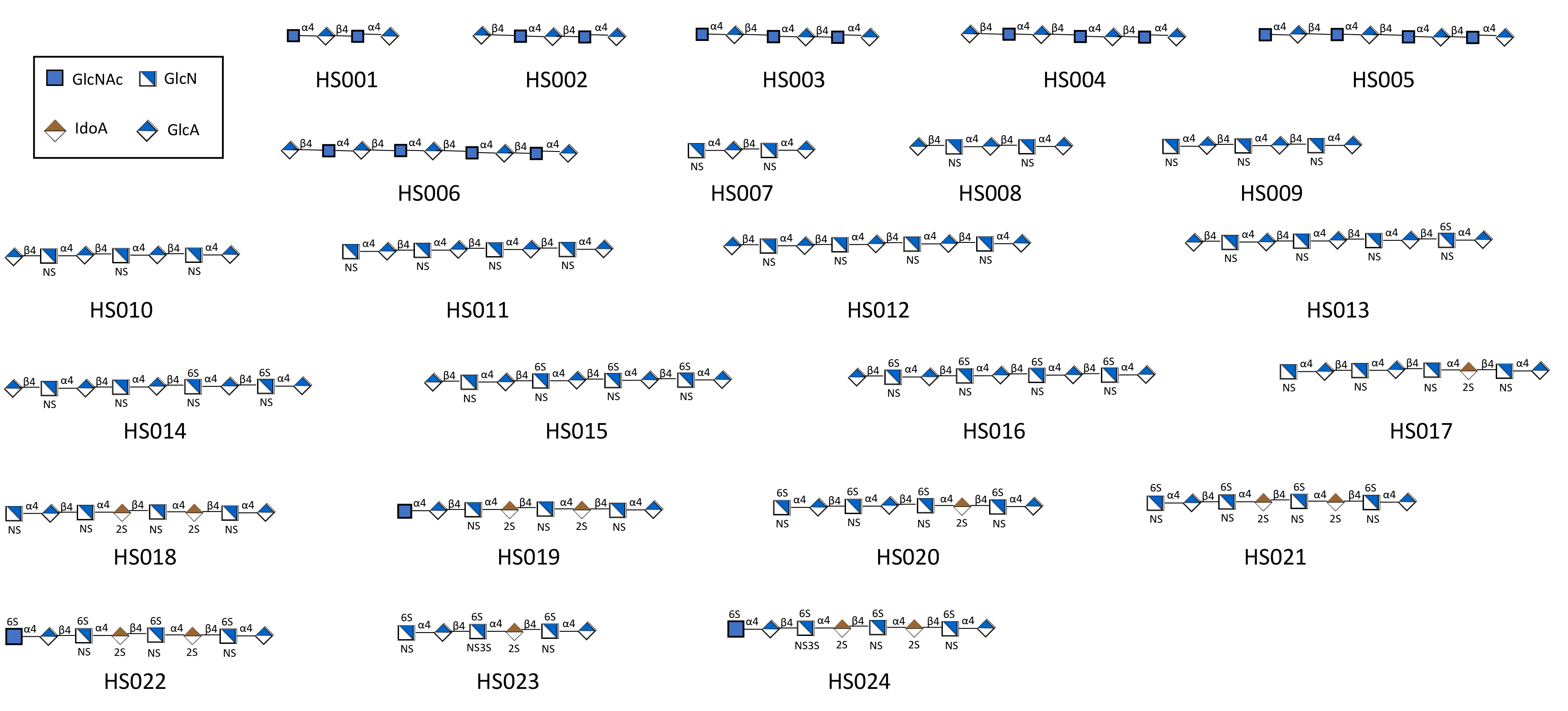
| ID | Structure |
|---|---|
| HS001 | GlcNAcα1-4GlcAβ1-4GlcNAcα1-4-GlcA |
| HS002 | GlcAβ1-4GlcNAcα1-4GlcAβ1-4GlcNAcα1-4GlcA |
| HS003 | GlcNAcα1-4GlcAβ1-4GlcNAcα1-4GlcAβ1-4GlcNAcα1-4GlcA |
| HS004 | GlcAβ1-4GlcNAcα1-4GlcAβ1-4GlcNAcα1-4GlcAβ1-4GlcNAcα1-4GlcA |
| HS005 | GlcNAcα1-4GlcAβ1-4GlcNAcα1-4GlcAβ1-4GlcNAcα1-4GlcAβ1-4GlcNAcα1-4GlcA |
| HS006 | GlcAβ1-4GlcNAcα1-4GlcAβ1-4GlcNAcα1-4GlcAβ1-4GlcNAcα1-4GlcAβ1-4GlcNAcα1-4GlcA |
| HS007 | GlcNSα1-4GlcAβ1-4GlcNSα1-4GlcA |
| HS008 | GlcAβ1-4GlcNSα1-4GlcAβ1-4GlcNSα1-4GlcA |
| HS009 | GlcNSα1-4GlcAβ1-4GlcNSα1-4GlcAβ1-4GlcNSα1-4GlcA |
| HS010 | GlcAβ1-4GlcNSα1-4GlcAβ1-4GlcNSα1-4GlcAβ1-4GlcNSα1-4GlcA |
| HS011 | GlcNSα1-4GlcAβ1-4GlcNSα1-4GlcAβ1-4GlcNSα1-4GlcAβ1-4GlcNSα1-4GlcA |
| HS012 | GlcAβ1-4GlcNSα1-4GlcAβ1-4GlcNSα1-4GlcAβ1-4GlcNSα1-4GlcAβ1-4GlcNSα1-4GlcA |
| HS013 | GlcAβ1-4GlcNSα1-4GlcAβ1-4GlcNSα1-4GlcAβ1-4GlcNSα1-4GlcAβ1-4GlcNS6Sα1-4GlcA |
| HS014 | GlcAβ1-4GlcNSα1-4GlcAβ1-4GlcNSα1-4GlcAβ1-4GlcNS6Sα1-4GlcAβ1-4GlcNS6Sα1-4GlcA |
| HS015 | GlcAβ1-4GlcNSα1-4GlcAβ1-4GlcNS6Sα1-4GlcAβ1-4GlcNS6Sα1-4GlcAβ1-4GlcNS6Sα1-4GlcA |
| HS016 | GlcAβ1-4GlcNS6Sα1-4GlcAβ1-4GlcNS6Sα1-4GlcAβ1-4GlcNS6Sα1-4GlcAβ1-4GlcNS6Sα1-4GlcA |
| HS017 | GlcNSα1-4GlcAβ1-4GlcNSα1-4GlcAβ1-4GlcNSα1-4IdoA2Sβ1-4GlcNSα1-4GlcA |
| HS018 | GlcNSα1-4GlcAβ1-4GlcNSα1-4IdoA2Sβ1-4GlcNSα1-4IdoA2Sβ1-4GlcNSα1-4GlcA |
| HS019 | GlcNAcα1-4GlcAβ1-4GlcNSα1-4IdoA2Sβ1-4GlcNSα1-4IdoA2Sβ1-4GlcNSα1-4GlcA |
| HS020 | GlcNS6Sα1-4GlcAβ1-4GlcNS6Sα1-4GlcAβ1-4GlcNS6Sα1-4IdoA2Sβ1-4GlcNS6Sα1-4GlcA |
| HS021 | GlcNS6Sα1-4GlcAβ1-4GlcNS6Sα1-4IdoA2Sβ1-4GlcNS6Sα1-4IdoA2Sβ1-4GlcNS6Sα1-4GlcA |
| HS022 | GlcNAc6Sα1-4GlcAβ1-4GlcNS6Sα1-4IdoA2Sβ1-4GlcNS6Sα1-4IdoA2Sβ1-4GlcNS6Sα1-4GlcA |
| HS023 | GlcNS6Sα1-4GlcAβ1-4GlcNS3S6Sα1-4IdoA2Sβ1-4GlcNS6Sα1-4GlcA |
| HS024 | GlcNAc6Sα1-4GlcAβ1-4GlcNS3S6Sα1-4IdoA2Sβ1-4GlcNS6Sα1-4IdoA2Sβ1-4GlcNS6Sα1-4GlcA |
Antithrombin III binds to specific heparan sulfate glycans
The heparan sulfate glycan array was assayed with antithrombin III (10 μg/ml), followed by an anti-antithrombin III antibody (2 μg/ml), and then an anti-mouse IgG antibody (10 μg/ml). The array was scanned with a microarray scanner at 532nm wavelength. Positive control showed bindings. Antithrombin III binds to HS023 and HS024.
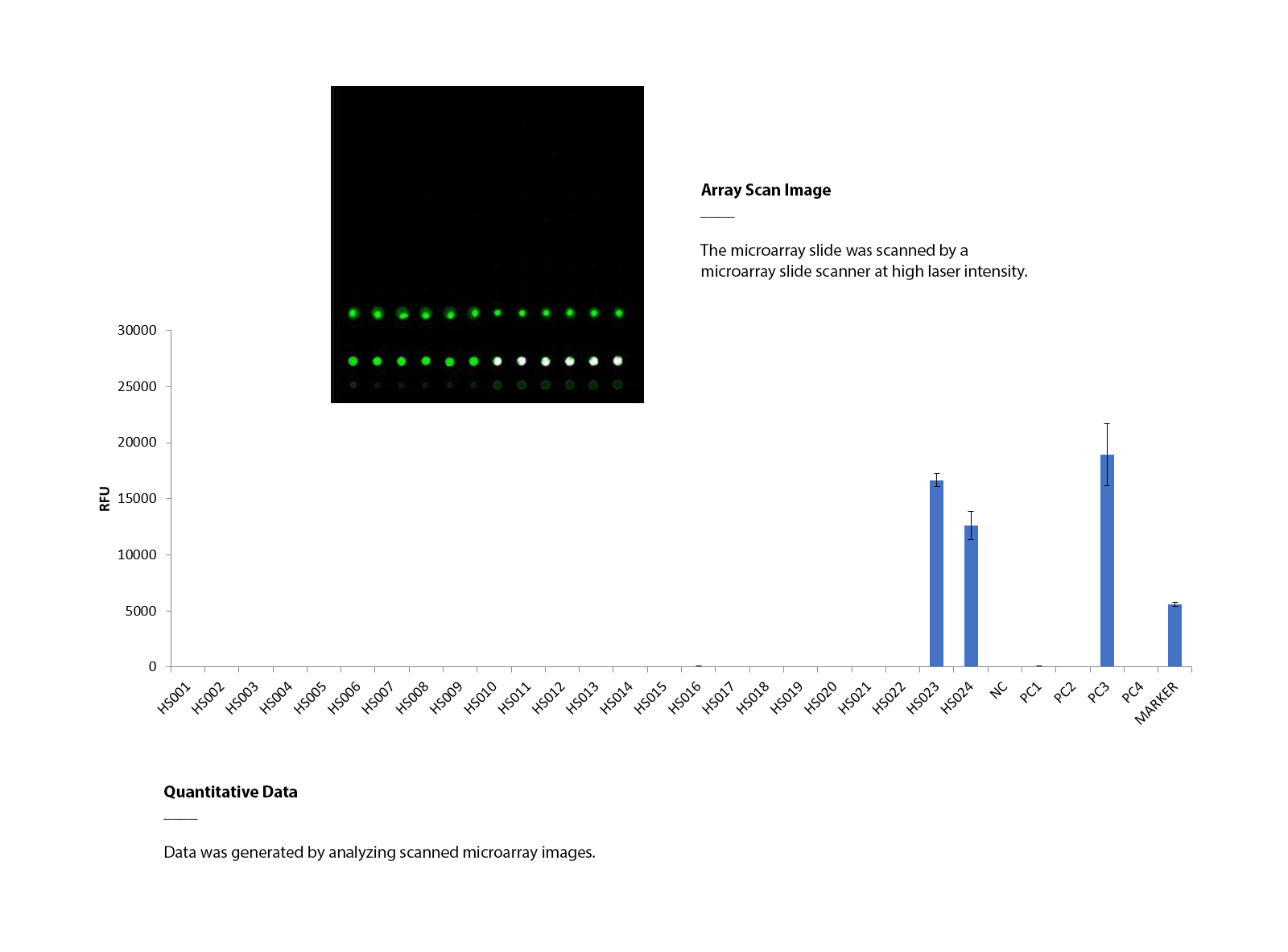
List of heparin & heparan sulfate glycan structures on the array (download the PDF)
Protocol & User Manual (download the manual)
